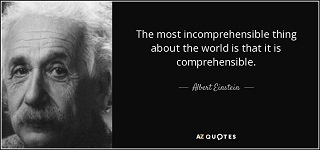Does Science Have an Endpoint?

The incredibly quotable Albert Einstein once said, “The most incomprehensible thing about the world is that it is comprehensible.” He died in 1955 (the year I was born), and that’s quite a while ago; I wonder if he would say that today, as more questions seem to have emerged than answers.
I heard a discussion earlier in the week (I wish I could find it and link to it) in which a participant doubted that our species has the capacity to understand things like the basic building blocks of the universe and the nature of human consciousness itself. He said, “I have the smartest cat you’ll ever see, but I don’t try to teach her to speak French.” The parallel seems apt, doesn’t it?
We’re the product of billions of years of evolution, most recently from hunter-gatherers, on a planet that’s one of uncountable trillions in the universe. Our development, based on natural selection and pure chance, was based on our ability to use our brains to solve the basic problems associated with survival and procreation. What’s the guarantee, or even the likelihood, that this has produced an animal with the intuitive capacity to grasp the underlying nature of the universe and the life forms that inhabit it?
Of course, it’s looking more likely every day that we’ll never know the truth, because our indifference and incivility to one another has grown to the point that our society may be in the process of destroying itself. Yet there are many good reasons to work hard, so as to keep the human race around for a while, and answering the question above is only one of them.

The more we learn about science, the more we realize that we have much more to learn.
This article seems to assume that we some how “deserve” an answer. Quantium Physics is telling us that to “look” changes what we see.
Similarly, repeat studies are sometimes showing different results when some part of the human population becomes aware of the expected results.
If the place we stand is then so “imperfect” as to give varying results we need an independent observer.
There was a sci fy short story which postulated a super computer which was asked the meaning of existance. Across eons it continued to return the same response that it needed more time, until first humanity died out and the universe itself began to fade to ultimate darkness until it finally returned the answer to the question, “Let there be light.”
Breath,
Ha! We had the same reaction to Craig’s post.
I posted my response to Craig’s post before reading yours.
For those that have not read Asimov’s “The Last Question”, it’s incredibly short, and arguably the best short story ever written.
“Can the entropy of the universe be reversed?”